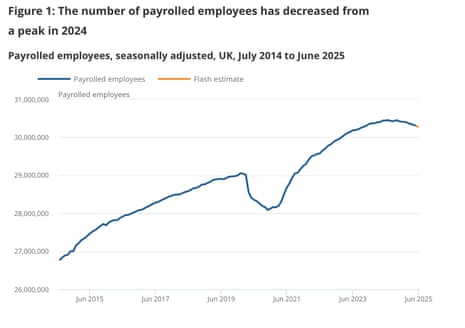Today’s jobs report shows that there has been a steady drop in the number of payrolled employees in the UK this year.
Company payrolls peaked in July 2024, the month of the general election, at 30.451m.
But they have fallen in most months since; by last month, payrolls had dropped to an estimated 30.265m.
That, the ONS reports, is a decline of 178,000 employees over the 12-month period since June 2024.

A chart showing UK payrolls Photograph: ONS
This decline will fuel criticism of Rachel Reeves’s budget last autumn, which hiked taxes on employers, leading to warnings that companies would cut back on hiring.
Today’s jobs report estimates that last month, payroll numbers fell by 41,000 people.
But there is some good news for the government. The ONS has revised its estimate for May’s payroll numbers, to a decrease of 25,000, not the whopping 109,000 fall first estimated.
That suggests the job
Updated at 03.39 EDT
Key events
Please turn on JavaScript to use this feature
Closing post
Time to recap….
UK unemployment climbed and wage growth slowed in the three months to May, according to official figures that will pressure the Bank of England to cut interest rates next month.
Data from the Office for National Statistics, released on Thursday, showed that Britain’s official unemployment rate rose to 4.7% in the three months to May, up 0.1% from April to reach the highest level since June 2021.
Pay growth slipped from 5.3% to 5%, as forecast by City analysts. Unemployment had been expected to remain at 4.6%.
In the private sector, pay rises were 3.7% on average in May, a sharp fall from 4.3% in the three months to April.
The ONS director of economic statistics, Liz McKeown, said the labour market “continues to weaken”.
The jobs data showed that payrolls have fallen by 178,000 over the last year – a worrying decline, but less severe than expected after May’s payroll data was revised higher.
The chances of a UK interest rate cut in August pushed higher after the data was released, to over 77%.
The head of Germany’s Bundesbank has warned that the high import tariffs U.S. President Donald Trump currently plans to impose on European goods could push the German economy into recession.
Bundesbank President Joachim Nage also warned against interfering with the independence of central banks, following Donald Trump’s attacks on Federal Reserve Chair Jerome Powell.
Nagel says:
“Independence of central banks is the DNA of central banks. So I believe it is dangerous to play with the independence of a central bank.”
Elsewhere….
A “challenging” luxury market and retreat from gaming have prompted a fall in sales and profits at Mike Ashley’s Frasers.
Jaguar Land Rover has said it will axe up to 500 management jobs in the UK after reporting a plunge in sales linked to Donald Trump’s tariffs.
An HS2 subcontractor has been terminated from its role supplying labour to build a £100m “bat tunnel” following an investigation into allegations of overinflating rates for staff.
On the economic front, US jobless claims fell last week while retail sales across America rose faster than expected in June. This data makes an early US interest rate cut less likely, economists said.
And the amount of tax paid by current and former non-doms in the UK rose by 2% in 2023-24, new data shows.
ING say today’s US jobless claims, and retail sales, data suggest there is little need for an imminent rate cut.
James Knightley, chief international economist, US at ING, says:
Today’s US data is generally on the firmer side in terms of activity and jobs, while import prices are a touch softer than anticipated. Overall, it supports the view that there is little pressing need for another interest rate cut from the Federal Reserve.
ShareIreland’s exports to US surge in pre-tariffs rush

Lisa O’Carroll
Irish exports to the US rocketed in the first five months of the year as pharma, food and whiskey manufacturers scrambled to beat Donald Trump’s tariffs, my colleague Lisa O’Carroll writes.
Overall exports to all parts of the globe went up by 47% to €134.4bn compared with the same period last year, Ireland’s the Central Statistics Office said.
Jane Burmanje, statistician in the international trade in goods division, explained:
“This is largely driven by growth in the exports of goods to the US. Year to date, January to May 2025 exports of goods to the US increased by 153% (€42.8 billion) to €70.8 billion compared with the same period last year (€28 billion).”
Exports of medical and pharmaceutical products represented almost 58.7% of all goods exports in May alone, according to the Central Statistics Office, a government agency.
Its monthly trade data shows that exports of pharma year on year rose by a massive 74% to €13.9bn in May.
Imports of the same products also increased, shooting up by 60% to €703.8mn year on year.
This could reflect the complex supply chain involving active ingredients or sometimes entire drugs being imported by multinationals allowing the to book their profits in Ireland.
ShareBundesbank chief: Trump tariffs could push Germany into recessionPresident of the Bundesbank Dr Joachim Nagel speaks during an interview at the G20 finance meeting in Durban Photograph: Rogan Ward/Reuters
The head of Germany’s Bundesbank has also warned that Donald Trump’s trade wars could drive Europe’s largest economy into recession.
Speaking in South Africa, where G20 finance ministers are meeting, Bundesbank President Joachim Nagel warned:
“If tariffs materialise in August, a recession in Germany in 2025 cannot be ruled out.”
Updated at 09.58 EDT
Wall Street opens a little higherA desk on the floor of the New York Stock Exchange. Photograph: Angela Weiss/AFP/Getty Images
A cautious start to trading in New York has seen the main indices rise slightly in early trading.
Here’s the details:
Dow Jones industrial average: up 129 points or 0.3% at 44,384
S&P 500: up 6 points or 0.1% at 6,270 points
Nasdaq Composite: up 24 points or 0.12% at 20,754 points
ShareHS2 subcontractor on £100m ‘bat tunnel’ suspended after claims of inflated staff pay rates

Mark Sweney
Back in the UK, an HS2 subcontractor has been terminated from its role supplying labour to build a £100m “bat tunnel” following an investigation into allegations of overinflating rates for staff.
BAM Nuttall (BAM), part of a consortium that is the main works contractor for the much-delayed £80bn-plus high-speed rail line between London and Birmingham, said it had ended the involvement of Danny Sullivan Group (DSG) on projects where “compliance issues have been identified”, my colleague Mark Sweney reports.
It is understood that BAM sent a letter to DSG this week stating it is to terminate its contract on the 1km (0.6-mile) mesh structure to shield bats in Buckinghamshire ancient woodland, so that it can proceed with another labour supplier.
HS2 Ltd launched a separate investigation in May into DSG’s role providing workers to build the West Midlands section of the line amid allegations about its billing practices.
Updated at 08.59 EDT
US retail sales beat expectations
US retail sales have risen more rapidly than expected – which may be a sign that tariffs are pushing up cost.
US retail and food services sales are estimated to have risen by 0.6% month-on-month in June, and were 3.9% higher than in June 2024.
Although the data is seasonally adjusted, it is not adjusted for price changes – so this increase could reflect higher prices, rather than increased volumes.
Consumer spending rebounded in June. Retail sales rose 0.6% last month, easily beating expectations of +0.2%. It was the first monthly gain since March. Control group sales, a key GDP input, increased by 0.5%, outpacing expectations of +0.3%. pic.twitter.com/j2BgK8ROHx
— Cetera Investment Management (@ceteraIM) July 17, 2025
The report shows that sales at retail trade sites were up 3.5% on an annual basis, while spending at non-store retailers (web retailers) jumped by 4.5%. Sales at food service and drinking places were up 6.6% from June 2024.
Solid retail sales spending is an encouraging sign for the US economy; it could also sway some Federal Reserve policymakers from voting to cut interest rates soon.
ShareUS initial jobless claims fall
The US labor market continues to shrug off the impact of Donald Trump’s trade wars.
The number of American filing new ‘initial claims’ for unemployment support fell by 7,000 last week to 221,000, on a seasonally adjusted basis.
Jobless claims fall for a 5th straight week, and come in better than expected. With that and better than expected retail sales, yields are up this morning.
All in the middle of the President’s pressure campaign on the Fed chair.
Jobless claims at the lowest level since… pic.twitter.com/eaqhalfUd0
— Sonali Basak (@sonalibasak) July 17, 2025
Initial claims are a proxy for layoffs, so this indicates US companies are still holding onto staff despite the uncertainty about where tariffs will fall.
Updated at 09.01 EDT
Some traders bet on faster Bank of England cuts
The money markets are still pricing in two more quarter-point cuts to UK interest rates this year, but some traders think the Bank of England could lower borrowing costs faster.
Bloomberg reports that some traders have placed wagers in the UK options market that could net a more than 1,000% return if the Bank of England delivers more cuts this year than rates pricing suggests, ignoring the fact inflation has hit an eighteen month high.
Bloomberg report:
The bets were initiated on Thursday by purchasing option strategies tied to the Sterling Overnight Index Average rate — a proxy for policy rates.
They’ll pay out out almost £20m on initial outlays of around £1.5m if the benchmark rate falls to 3.5% this year — a quarter-point more than money markets are currently implying.
The wagers could entail such unusually large winnings because they’re somewhat contrarian. Expectations for BOE easing have been dialed back this week after stronger-than-expected UK inflation and wage growth figures.
ShareWorld’s largest crane lifts reactor dome into place at Hinkley Point CLand crane “Big Carl” lifts a 245-tonne domed roof onto the second reactor building at the Hinkley Point C nuclear power station, near Bridgwater. Photograph: Isabel Infantes/Reuters
Over in Somerset, The world’s largest crane has lifted a 245-tonne dome into place on top of the first nuclear power station to be built in the UK for 30 years.
The crane, known as Big Carl, lifted the 14-metre tall steel construction onto Hinkley Point C’s second reactor building this morning.
With the dome in place, the fit-out of the 44-metre-high Unit 2 of Hinkley Point C can now accelerate.
Tom Greatrex, chief executive of the Nuclear Industry Association, said:
“The lift showcases the value of Hinkley Point C: the project is creating thousands of skilled, well-paid jobs like the operatives who lifted the dome into place, and billions of investment are flowing into the local area.
Hinkley is driving economic growth in our industrial supply chain right across the country and proving the benefits of replication, with Unit 2 construction going 20-30% faster than Unit 1. We should secure the replica project at Sizewell C as soon as possible to preserve and expand the jobs, investment and construction expertise that Hinkley will provide.”
Photograph: Isabel Infantes/Reuters
Earlier this week, hundreds of workers at Hinkley Point C staged a wildcat strike in protest against alleged bullying by the project’s supervisors.
Here’s Kit Juckes, foreign exchange expert at Société Générale, on the market moves yesterday following reports (later denied) that Donald Trump had floated a plan to sack Fed chair Jerome Powell.
Yesterday evening’s Washington shenanigans aren’t just the stuff of ‘silly season’ because they reflect the President’s desire to replace Fed Chairman Jay Powell with someone who would be more enthusiastic about cutting rates.
Maybe this is aimed at wearing the Chairman down, or maybe it was a trial balloon, to see how the market might react. We got an 8bp fall in December Fed Funds pricing, a smaller fall in 10year yields, a spike in 30y yields, a 1% rise in EUR/USD and a 1% fall in the S&P 500.
A reaction, but certainly not a big enough one to stop the President’s campaign as he mutters under his breath ‘will no one rid me of this turbulent banker?’
ShareDeutsche Bank: Firing Powell would drive up bond yields, and hit dollar
Yesterday we got a glimpse of what might happen if the Trump administration removed Fed chair Jerome Powell from office, says Deutsche Bank strategist Jim Reid.
Using the probabilities from Polymarket, the likelihood of Powell’s removal this year had mostly been in the 10-15% range since January. But this week we moved to a higher range and yesterday we peaked at almost 40% before retracing back to around 20% by the close. That was still around 5pp lower than the open after Trump said he was “not planning” on firing Powell and that it was “highly unlikely, unless he has to leave for fraud”.
In the ~60 minutes between the CBS story broke that Trump was considering firing Powell, to the qualifying denial, the probability of Powell being ousted by the end of the year increased by around 15pp to 38%. Over this period, 10yr USTs yields climbed around +5bps, 30yr yields rose around +11bps, 2yr yields fell around -5bps and the EUR rose around +1.4% against the Dollar.
So, if you wanted to make a very crude calculation about what the immediate impact would be if he did fire Powell, you could multiply these numbers by four to get close to 100%. So from that point 10yr yields up another +20bps, 30yr yields up around +45bps, 2yr yields down another -20bps and maybe the dollar falling nearly -6%.
A chart showing Polymarket’s probability of Donald Trump sacking Fed chair Jerome Powell Photograph: Deutsche BankShare
Updated at 07.51 EDT
Downing Street: more to do to turn around the economy
Downing Street has said ther is “more to do” to turn round the economy, following this morning’s rise in unemployment, PA Media reports.
The Prime Minister’s official spokesman told reporters:
“The first job of this Government was to stabilise the British economy and the public finances and we’re now moving into a new chapter to deliver on the promise of change.”
He highlighted the UK having the fastest growth in the G7 in the first quarter of 2025, the trade agreements with the EU, US and India and faster wage growth as indications things were going in the right direction.
Asked if that meant the Prime Minister thought things were going well on the economy, the spokesman said:
“No, we are saying that there is still more to do.
“But, as I say, the economy is now showing signs of recovery because we took the right decisions to restore stability and fix that black hole.”
ShareTax take from non-domiciled and deemed domicile taxpayers rises by 2%

Juliette Garside
HMRC has just published its yearly stats on Britain’s non-doms, my colleague Juliette Garside reports.
This globally mobile, high earning group is the topic of hot debate after suggestions, often from low-tax lobbyists, that the abolition of tax breaks they previously enjoyed has driven many away from the UK.
The stats show the numbers claiming the non-dom tax break, combined with those who declared themselves as deemed domiciled, was 83,000 in the 2023-24 financial year. This represents a fall of 1% from 83,900 on the previous year.
Deemed domicile is the group who have been resident too long to claim the tax break – except for inheritance tax purposes.
There were 9,100 newly arrived non-doms in the year, a fall of 5,100 on the previous year, which saw a bump as travel opened up again after the pandemic. This was offset by a fall in those claiming non-dom status, and 500 fewer deemed domiciled taxpayers.
The amount of tax collected from these two groups rose: their combined contribution was £12bn, a 2% increase on the previous year, with most of that money collected through income taxes.
Photograph: HMRC
Despite the spin about non-doms abandoning London’s wealthiest postcodes, the numbers themselves don’t yet show an impact from policy changes. Conservative chancellor Jeremy Hunt’s clampdown, which removed the right to shelter non-UK income from UK taxes, was announced in March 2024, just two weeks before the end of the end of the period covered by today’s statistics.
Labour’s full abolition of non-dom regime, which removed the right of those with a trust offshore to avoid UK inheritance taxes, only came into effect in April this year.
There is no sign of an exodus just yet, says Arun Advani, director of the Centre for the Analysis of Taxation, explaining:
“These stats are from before the current reform, covering only a couple of weeks after Jeremy Hunt’s announcement, so can’t tell us anything about impacts on migration.
“A tax increase of this magnitude will surely lead some people to leave, as we saw last time. That is still consistent with the reform raising serious money, as those who stay pay a lot more. We’ll get the first solid number on who left after the reform in the summer of 2027.”
ShareBundesbank chief defends Powell against Trump attacks
Germany’s top central banker has ridden to the defence of US Federal Reserve chair Jerome Powell, who has faced persistent attacks from Donald Trump.
Joachim Nagel, the head of Germany’s Bundesbank, has warned against interfering with the independence of central banks.
Nagel said:
“Independence of central banks is the DNA of central banks.
So I believe it is dangerous to play with the independence of a central bank.”
Trump has repeatedly criticised Powell for not cutting US interest rates since his return to the White House, claiming that the Fed funds rate should be several percentage points lower.
Yesterday, Trump insisted it was “highly unlikely” he would dismiss the Fed chair, after a report that he was on the verge of firing Powell triggered a stock market selloff.
ShareHospitality industry suffers ‘devastating’ job losses
The UK hospitality industry is alarmed that more than half the fall in payroll numbers last month was due to job losses in accommodation and food services.
As covered this morning (see earlier post), payrolls across the accommodation and food service activities sector has fallen by 108,000 employees over the last year, out of 178,000 in total.
Kate Nicholls, chair of UKHospitality, says:
“These devastating job losses are a direct consequence of policy decisions at last year’s Budget, which have disproportionately hit the hospitality sector.
“The change to employer NICs in particular, was socially regressive and had a disproportionate impact on entry level jobs. Without a change of tack from the Government we could be looking at even more job losses in hospitality, when we should be bringing people into the jobs market.
“We desperately need to see action at the upcoming Budget. We urge the Government to act on our asks to fix NICs, by extending the existing exemptions to include both young people and people moving from welfare to work, which will boost jobs and help to reverse this huge loss.
“We also need to see lower business rates to revive high streets, and a VAT cut on hospitality to drive investment. We have seen time and time again that our sector is extremely capable of meeting the Government’s growth and employment objectives, if given the optimal operational environment. This is why we need our asks met, before we are taxed out.”
Photograph: ONSShare
Updated at 06.45 EDT
